 The fruit or venison which nourishes the wild Indian, who knows no enclosure, and is still a tenant in common, must be his, and so his (ie a part of him) that another can no longer have any right to it, before it can do him any good for the support of... The fruit or venison which nourishes the wild Indian, who knows no enclosure, and is still a tenant in common, must be his, and so his (ie a part of him) that another can no longer have any right to it, before it can do him any good for the support of...  Two Treatises of Government: By Iohn Locke - Page 214by John Locke - 1764 - 416 pagesFull view Two Treatises of Government: By Iohn Locke - Page 214by John Locke - 1764 - 416 pagesFull view - About this book
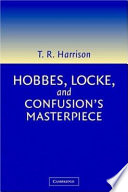 | Ross Harrison - History - 2003 - 292 pages
...America taking fruit or killing deer, and says that when it nourishes him it 'must be his, and so his, ie a part of him that another can no longer have any right to it, before it can do him any good for the support of his life' [Sec. 26]. But surely this is the same confusion. Of course, to nourish him the... | |
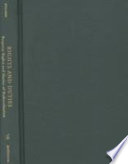 | Carl Wellman - History - 2002 - 424 pages
...goods is one which comes ahout through certain historical processes. The argument runs as follows: Though the earth and all inferior creatures be common to all men, yet even man has a property in his own person; this nohody has any right to but himself. The lahour of... | |
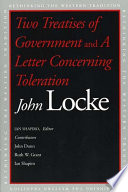 | John Locke - Political Science - 2003 - 378 pages
...the wild Indian, who knows no enclosure, and is still a tenant in common, must be his, or so his, ie a part of him, that another can no longer have any...right to it, before it can do him any good for the support of his life. § 27. Though the earth, and all inferior creatures, be common to all men, yet... | |
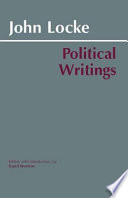 | John Locke, David Wootton - Philosophy - 2003 - 492 pages
...the wild Indian, who knows no enclosure, and is still a tenant in common, must be his, and so his (ie a part of him) that another can no longer have any...right to it, before it can do him any good for the support of his life. 27. Though the earth and all inferior creatures be common to all men, yet every... | |
 | James Macdonald - Business & Economics - 2003 - 590 pages
...one's person, the first and fundamental form of property that had existed since the Garden of Eden. "Though the earth, and all inferior creatures, be common to all men [in a state of nature], yet every man has property in his own person. . . ,"58 If the unfree lost ownership... | |
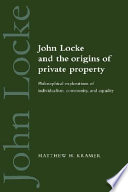 | Matthew H. Kramer - Business & Economics - 2004 - 368 pages
...the wild Indian, who knows no Inclosure, and is still a Tenant in common, must be his, and so his, ie a part of him, that another can no longer have any...right to it, before it can do him any good for the support of his Life." Instead, the premise that the food had to be "a part of [the Indian]" was a premise... | |
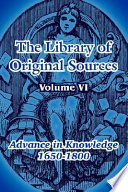 | Oliver J. Thatcher - History - 2004 - 466 pages
...wild Indian, who knows no inclosure. and is still a tenant in common, must be his, and so his, ie, a part of him, that another can no longer have any...right to it, before it can do him any good for the support of life. Though the earth, and all inferior creatures, be common to all men, yet every man... | |
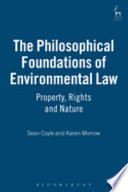 | Sean Coyle, Karen Morrow - Law - 2004 - 245 pages
...anyone else. The food which nourishes the wild, uncivilised man 'must be his, and so [much] his, ie a part of him, that another can no longer have any...right to it, before it can do him any good for the support of his life.'111 On the back of this proposition, Grotius had charted the emergence of 'de... | |
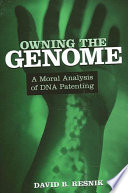 | David B. Resnik - Science - 2012 - 251 pages
...Locke, the founder of libertarian political philosophy, held that our bodies are our own property: Though the earth, and all inferior creatures, be common to all men, yet every man has property in his own person: this no body has right to but himself. The labour of his body and the 'work... | |
 | Herman Lebovics - History - 2006 - 196 pages
...the wild Indian, who knows no Inclosure, and is still a Tenant in common, must be his, and so his, ie a part of him, that another can no longer have any...right to it, before it can do him any good for the support of his Life."10 Locke could then offer his famous formulation that, if "the Earth, and all... | |
| |